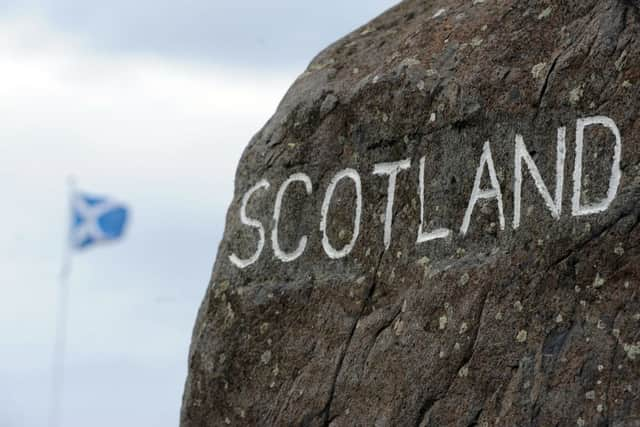Comment: Society will drive change not white paper


‘Necessary but not sufficient” would be the best way to characterise the SNP Scottish Government’s white paper on independence in terms of whether it’s capable of doing the job of helping win a Yes vote.
But more importantly, the balance between the “necessary” and the “not sufficient” was tilted way in favour of the latter. About 30:70 would be a rough guess at the ratio.
Advertisement
Hide AdAdvertisement
Hide AdThere’s no doubt that the credit must be given to the SNP to getting us this far. Without its 2011 breakthrough, the day of the referendum on 18 September 2014 would never come.


And it’s precisely that point that makes the white paper so disappointing.
Given the huge build up given to its launch by the SNP government, the white paper was always going to have to be something rather special if it was not to be an anti-climax. But apart from a few new policy pledges, it was all fairly predictable and, thus, anti-climatic. It was a confirmation of most of what we already knew.
There was confirmation of a very conservative view of independence as per keeping the pound and staying in a currency union with the rest of Britain, retaining the monarchy, staying in Nato, cutting corporation tax and remaining within the UK regime of regulating finance capital.
Then there was the disappointment of no change to the income tax system (like moving to a progressive one where the richer pay far more) meaning no obvious rise in welfare spending, no obligation upon employers to pay a “living wage”, no re-nationalisation of key public infrastructure and utilities, and no significant change in employment law.


The most positive new item was the extension of childcare for the very young. This was added to what we already knew that was progressive. For example, the removal of nuclear weapons, the ending of the “bedroom tax”, the re-nationalisation of Royal Mail and the rise of the minimum wage in line with inflation.
This was followed by a sense of “back to the future”. On state pensions and collective consultation on redundancies, for example, the suggestions are to return the situation back to where it used to be several years ago. But this is only to make things less worse than they will become without really offering to make them better (and significantly better at that).
Finally, there were the warm words about what independence could bring about but which the SNP made no specific policy promises on.
Advertisement
Hide AdAdvertisement
Hide AdThe talk was that an independent Scottish Parliament could do this or that a commission would look at that. One such example was the idea of having workers represented on the board of companies and organisations.
Great idea but without the SNP as presumably the largest party in the parliament in a newly independent Scotland being committed to the idea, it amounts to no more than mere kite flying.
Overall, the White Paper was not so much the curate’s egg with good and bad bits but more like eating the proverbial “Chinese meal” – you feel full immediately afterwards but then the hunger pangs come not long after.
If one was to ask the now counter-factual question, “Why would a white paper dramatically change the things?”, one can begin to see what would have been needed to have the desired effect. Put simply, not only would the contents of the white paper have to be a real “game changer” but the prospect – if not guarantee – of a significant improvement in living standards for the vast majority of citizens under independence also had to be spelt out in stone.
On the day of the white paper’s launch, Alex Salmond mentioned the figure of £600, whereby independence would make the average citizen better off by that amount per year.
But this claim did not come across as particularly believable. It was like the rest of the white paper – and especially the voluminous question and answer appendix. Long on detail but not set in an overall political narrative that is credible and convincing. It is only when the overall political context becomes conducive that answers to certain questions become convincing.
The blindingly obvious component of the SNP’s flawed political narrative is that it promises to square the circle of maintaining and slightly increasing existing welfare commitments whilst having no new forms of revenue.
As the Baldrick character from Blackadder would no doubt ask, just exactly how is this “cunning plan” to be arrived at?
Advertisement
Hide AdAdvertisement
Hide AdThe SNP’s answer is that revenues from oil and a growing economy will increase the state’s spending power without increasing taxes or levying new ones. This is a most foolhardy assumption to make and involves no Plan B.
All this leaves the SNP with a number of political headaches after the warm glow of launch day fades away. First, what more has the SNP now to offer the electorate? And, second, with a case of plus ça change, how will the SNP motivate its activists to up the ante in their campaigning activities before the big day?
As the white paper on independence was the white paper to end all white papers, logically it cannot be added to. And, neither is there wriggle room in the process of clarification to make things look significantly better than they actually are. The white paper is the final article. Altering this line undermines the SNP’s political credibility.
For the activists, a confirmation of what they already knew to be the case and the launch of an extremely hefty document that will not be a bestseller on the doorsteps does not make their task any easier. They needed some truly momentous new headline commitments and figures to deliver a knockout blow on the campaigning trail.
But all this was pretty predictable. Documents do not in themselves change anything. It is social forces that bring about political change. The SNP has remained true to its political self. It is up to forces like the Radical Independence Campaign (RIC) to now make the running.
• Gregor Gall is professor of industrial relations at the University of Bradford and author of the newly published Scotland the Brave? Independence and radical social change.